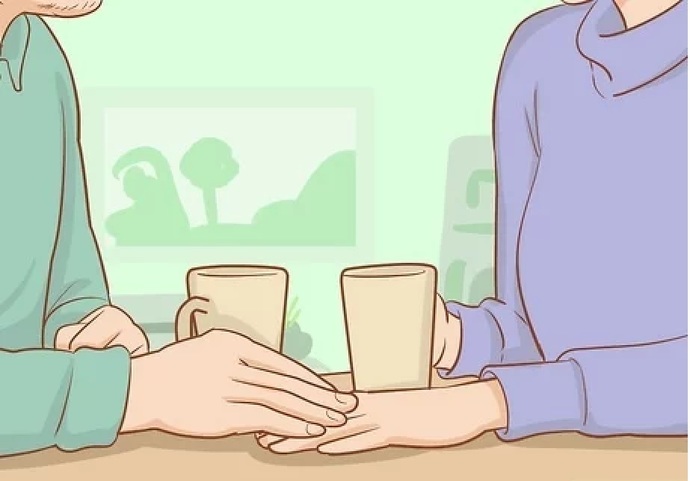Our souls crave intimacy. Intimacy in a relationship is a feeling of being close, emotionally connected and supported. It means being able to share a whole range of thoughts, feelings and experiences that we have as human beings. But what is the definition of intimacy? Sometimes people do just about anything to get close to someone they find interesting, intriguing or just plain irresistible. Is that being intimate? According to Dictionary, intimate is defined as, showing a close union or combination of particles or elements: an intimate mixture. Often intimacy is defined using terms as cohesion, closeness, support, trust, self-disclosure, responsiveness, presence, interdependence, and positivity. Being intimate involves the mixing of our life with another’s, a mingling of souls, a sharing of hearts. This is something we all long for because it is how Nature made us. We are designed to connect.

Sometimes singles — and everyone else on the planet — will go to great lengths and even make complete fools of themselves to get close to the opposite sex. Is it because of our innate desire for sex? Is it because of loneliness? Desperation? Stupidity? Hormones? Of course, it is all of the above, but the answer I am focused on is: intimacy. The human desire for intimacy, for love, drives us to do things that we never thought we would. But why, and what does intimacy mean?
Being intimate means “in-to-me-see”. One evening over dinner with friends, we spoke about intimacy and what it means. My husband shared this cute little phrase with us, and I strongly believe that this is the true definition of intimacy. he said it is a blending of our heart with another’s, so we can “see into” who they really are, and they can “see into” us.

Most of us are wondering about sex. Sex is a part of intimate expression, but it is not intimacy. The intimacy is more than sex. Sex is the most intimate and beautiful expression of love, but we are only lying to ourselves when we act as if sex is proof of love. We live in a world of users where we abuse each other to dull the pain of aloneness.
The true intimacy is not found just by merging bodies in sex. How many couples go to bed, share their bodies, but not their hearts? Sex is not the source of intimacy, but an outlet or expression of it. No matter how hard you try, if real emotional and spiritual intimacy does not exist before sex, it most certainly will not after. Real intimacy makes us feel alive like we have been found, as if someone finally took the time to peer into the depths of our soul and really see us there. If you focus on all that he or she is not, you will miss what he or she is. When we ignore another person’s beauty and all that Nature made them to be, intimacy is lost. Because intimacy flows out of feeling wholly accepted just the way we are.
In addition to accepting another person just how they are, real intimacy can only begin once you know yourself. Since the definition of intimacy essentially means “in-to-me-see,” how can anyone “see into” you and who you are your fears, dreams, hopes and desires unless you know who you are and are willing to allow someone in? Experiencing true intimacy begins with being connected to your own heart. There are four key forms of intimacy.

Physical intimacy: Physical Intimacy means being in the same place at the same time and spending quality time together. (For example, on a date moments / night.)
Emotional Intimacy; Emotional Intimacy means sharing emotions, thoughts and connecting on a feeling level.

Sensual Intimacy: Sensual intimacy means physical touch and pleasure and other ways to physically connect that do not involve sexual acts. (Including hugging and kissing.)
Sexual Intimacy: Sexual intimacy includes penetrative - vaginal or anal sex, oral sex, and other forms of sexual contact.
Everyone is different, and we all desire these different forms of intimacy to varying degrees in our relationships. I am always surprised to know the role of hormones in intimacy, sexual relationships and health between man and woman. Actually they are driving all these things occurring in our life. They are partially responsible for our being Male or Female too.
Hormones are natural substances mainly produced in our body. They help to relay messages between cells and organs and affect many bodily functions. Everyone has what are considered “male” and “female” sex hormones. The two main female sex hormones are estrogen and progesterone. Although testosterone is considered a male hormone, females also produce and need a small amount of this, too.
Estrogen is the major female hormone. The lion’s share comes from the ovaries, but small amounts are produced in the adrenal glands and fat cells. During pregnancy, the placenta also makes estrogen. Estrogen plays a big role in reproductive and sexual development.
Estrogen levels can be determined by a blood test. Levels will vary greatly throughout the menstrual cycle. The ovaries produce the female sex hormone progesterone after ovulation. During pregnancy, the placenta also produces some. Progesterone levels can be determined by a blood test. Small amounts of testosterone come from the adrenal glands and ovaries. This hormone plays a role in several body functions, including: sexual desire and regulation of the menstrual cycle. A blood test can determine your testosterone level.
Estrogen, progesterone, and testosterone all play a role in female sexual desire — also called libido — and sexual functioning. Due to hormonal fluctuations, females are generally at the peak of sexual desire just before ovulation. There is generally less fluctuation in libido if you are using hormonal birth control methods, which affect hormone levels. Undergoing surgery to remove adrenal glands or ovaries cuts down on testosterone production, and it cause a drop in libido. Oxytocin is a hormone and a neurotransmitter that is involved in childbirth and breast-feeding. But it is also associated with empathy, trust, sexual activity, and relationship-building. This is why it is referred to as the “love hormone,” levels of oxytocin increase during hugging and orgasm. Oxytocin activates feelings of trust and attraction between people when it is released in the brain, and it rises in the early stages of romantic love.
Sexual motivation is influenced in male by hormones mainly by testosterone, oxytocin, and vasopressin and partially based on estrogen and progesterone. Estradiol is the predominant form of estrogen that plays a critical role in male sexual function. Estradiol in men is essential for modulating libido, erectile function, and spermatogenesis. Progesterone is known as a female hormone, but males need progesterone to produce testosterone. The adrenal glands and testes in males produce progesterone. Sex hormones control the ability and motivation to engage in sexual behaviors. Intimacy hormone or bonding hormone in male is Oxytocin. In males, oxytocin helps move sperm. There is another hormone, called vasopressin, which plays a stronger role in bonding for men. This anti-social effect of a social hormone brings some nuance to the story of oxytocin. High levels of dopamine and a related hormone, norepinephrine, are released during attraction. These chemicals make us giddy, energetic, and euphoric, even leading to decreased appetite and insomnia – which means you actually can be so “in love” that you can't eat and can't sleep.
Testosterone levels in male exhibit a rhythm that corresponds to recent sexual activity. Testosterone is major contributing factor to sexual motivation in male. Elimination of testosterone in male does not reduce the ability to copulate; it reduces the motivation to copulate. Men involved in polyamorous relationships display higher levels of testosterone than men involved in either a committed single partner relationship or single men.
The hormones oxytocin and vasopressin are implicated in regulating both male and female sexual motivation. Oxytocin is released at orgasm and is associated with both sexual pleasure and the formation of emotional bonds. The increased sexual pleasure that occur following oxytocin release encourages and motivate to engage in more and more future sexual activities.
In males, vasopressin is involved in the arousal phase. Vasopressin levels increases during erectile response in male sexual arousal, and decrease back to baseline following ejaculation. The increase of vasopressin during erectile response is directly associated with increased motivation to engage in sexual behaviour.

Intimacy and sex can go hand in hand, but they are not one and the same. Intimacy on its own involves trust, acceptance, and an emotional connection with another person. Intimate partners care for one another and are unafraid to share thoughts, desires, and vulnerabilities. In addition to romantic partners, you can have intimate relationships with friends, family members, and other people in your life.
Even without sex, intimacy can provide many physical and mental health benefits. There has to be an evolutionary reason why people maintain paired bonding and intimacy when there is no sex involved. Indeed, we have found that there are biological advantages of being a dyad over an individual. The lines can get blurred at times, but you can have intimacy without sex and vice versa. Intimacy is more of an emotional connection rather than a physical connection. As relationships increase in duration and age, the sexual frequency may decline, but intimacy may increase. But while sex and intimacy are different, they are interrelated. They go hand in hand. Some partners need to feel loved and cared for to be intimate, and some need to perform sexually to demonstrate that they love and care.

Intimacy, in all its forms, has a variety of health benefits for body and mind. There are some different ways that intimacy can improve our daily living. Chronic stress can cause a host of health complications, such as insomnia, muscle pain, high blood pressure, cardiac events, a weakened immune system, irritable bowel syndrome, and inflammatory bowel disease, among others. When you are in a constant state of fight-or-flight, you use up a lot of necessary nutrients needed to maintain health. Intimacy helps reduce the stress and panic so that your body can replenish itself and maintain a good immune system.
Social isolation is linked with increased morbidity and mortality in addition to higher mortality, loneliness can also impair executive functioning, sleep, and mental and physical well-being. If you feel complimented, loved, and appreciated, that all contributes to good health.
While sex is not necessary to achieve intimacy, intimacy can often lead to a better sex life, which in itself has health benefits. Your experience of sex will improve because you will be unafraid to express and receive what you desire, and willing and open to hear and care for your partner’s needs as well. The trust will allow both of you to grow and try new things that might enhance your relationship.
The Health Benefits of Sexual Intimacy
The act of having sex can lead to many positive changes in the body, such as boosting oxytocin (“cuddle hormone”). A healthy sex life may also affect your immune system and blood pressure, lessen pain, and help you sleep better, he adds. In fact, orgasm alone can reduce blood pressure by releasing oxytocin. It has a calming effect that can last up to a few days. Sex is also a form of exercise which in itself has many health benefits.
Benefit of Intimacy for Mental Health
When you are intimate with your loved one, you get a mental boost too. Men who are deprived of intimacy get angry and women get depressed. Your hormone levels, especially oxytocin, actually change when you touch or are touched by someone, or share an intimate act such as decision-making. If you are connected in a loving relationship, you have more of the happy hormones like dopamine. If you are upset about something, you often feel comforted by discussing these issues with a close, empathetic companion. When you feel supported, you begin to overcome a certain amount of emotional pain and start the healing process. Emotional insensitivity weakens you. If you encounter a lack of empathy or humiliation from someone you trust, it can exacerbate your pain and retraumatize you. You may then withdraw or avoid intimate relationships, which can make depression or anxiety worse.
One of the basic definitions of intimacy is the sharing of what is personal and private. From this perspective, actual face-to-face contact is not necessarily required to experience a sense of intimacy. Human touch and other nonverbal cues play a very special role in promoting greater intimacy between individuals, individuals who know each other offline can also easily use the internet for intimate exchanges, which can reinforce their face-to-face contact.
But a healthy balance of face-to-face interactions alongside online interactions is important. The internet is a great tool that can promote intimacy in relationships through various applications, but it certainly cannot replace all aspects of human intimacy.
There are several ways to build trust and achieve intimacy. These include:
1. Be honest.
2. Strive for mutual and considerate communication.
3. Intimacy takes time. It is not something you can download an app for.
4. Do not think if you are not together every second, something is wrong.
5. Have fun together, need not to be intensely meaningful or serious.
6. Accept your partner and accept yourself. No one is perfect.
Feeling connected to each other through sex is one of the most fulfilling and satisfying experiences that this peculiar, wonderful human existence has to offer. But sometimes, despite longing for more closeness in our lives, we find ourselves struggling to experience truly intimate sex. Whether it is due to stress or exhaustion or losing touch with ourselves and our partners, sometimes we need a little help finding our path back to the intimacy that can live at the heart of sex.

 Sexual Relationships
Sexual Relationships  Sexual Health
Sexual Health 






Most Helpful Girls